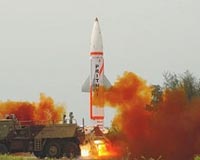| . |  |
. |
Washington (AFP) Oct 13, 2009 Despite decades of denials by Washington and Tokyo, US officials believe they enjoyed a secret pact to transport nuclear weapons through Japan, newly declassified documents showed. The disclosure came after Japan's left-leaning government ended more than half a century of conservative rule and launched a probe into thousands of files to settle longstanding suspicions of a hush-hush pact. Any evidence of an agreement would trigger charges of hypocricy as Japan is the only nation to have suffered nuclear attack and has campaigned for the worldwide abolition of the ultra-destructive weapons. The National Security Archive at George Washington University released documents Tuesday showing US officials believed they had an understanding with Japan when the allies signed a new security treaty in 1960. A confidential State Department memo prepared in 1960 for then secretary of state Christian Herter to brief Congress said Washington had to consult Japan on "introduction of nuclear weapons." But it said that the United States, which has stationed troops in Japan since its defeat in World War II, could use Japanese soil "as needed" in an emergency if communist neighbor North Korea launched an attack. In a cable sent in 1963, then US ambassador to Japan Edwin O. Reischauer said he quietly met for breakfast with the foreign minister, Masayoshi Ohira, and sensed a "full understanding" on the nuclear issue. "Ohira took presentation in stride and showed not rpt (repeat) not slightest desire to persuade us to alter standing practice," the cable said. Whatever the sensitivity of nuclear weapons in Japan, the issue largely involves past history. In 1991 as the Cold War ended, president George H.W. Bush stopped US vessels from carrying tactical nuclear weapons. But both the United States and Japan's previous government have steadfastly rejected an inquiry, with Washington saying its military policy is never to confirm or deny the presence of nuclear weapons. "In terms of nuclear weapons, there has always been a resistance to releasing information, particularly where they are based," said Robert Wampler, a senior fellow at the National Security Archive who led the study. "But here we are talking about Cold War agreements -- dealing with Korea, Vietnam, the Soviets and China," he told AFP, pleading for the release of more documents. "It's secret in name only and I think it would be really great if the Japanese government would clear the air." But any investigation could also get bogged down in semantics on what the United States and Japan agreed to. One declassified 1960 document presented to the secretary of state said in typeface that there was a "confidental agreement." The word "agreement" was crossed off with a pen and replaced with "understanding." The documents also said US negotiators stressed that they would not "introduce" nuclear weapons to Japan -- drawing a distinction with transiting the arms. The documents provide no clear smoking-gun on one persistent suspicion -- that US president Richard Nixon insisted on the nuclear transit rights when handing the southern island chain to Okinawa back to Japan in 1972. But a 1969 memo by Henry Kissinger, then the national security adviser, detailed Nixon's negotiating strategy -- saying he would press until the last minute to keep US nuclear weapons in Okinawa and was ready to drop the demand in exchange for the transit rights. Nixon negotiated the handover with Japanese prime minister Eisaku Sato, who later won the Nobel Peace Prize largely for his so-called "three principles" -- that Japan will not possess, produce or allow nuclear weapons on its soil. The United States dropped atom bombs on Hiroshima and Nagasaki in 1945, killing more than 210,000 people and ending World War II.
Share This Article With Planet Earth
Related Links Learn about nuclear weapons doctrine and defense at SpaceWar.com Learn about missile defense at SpaceWar.com All about missiles at SpaceWar.com Learn about the Superpowers of the 21st Century at SpaceWar.com
 India tests nuclear-capable missiles
India tests nuclear-capable missilesNew Delhi (UPI) Oct 13, 2009 In quick succession, India test-fired short-range ballistic missiles capable of carrying nuclear warheads. The two advanced versions of the Prithvi-II surface-to-surface ballistic missiles have a range of up to 217 miles. They were launched from Chandur in the east state of Orissa into the Bay of Negal. "The two P-II missiles, which can carry 500kg warheads were successfully ... read more |
|
| The content herein, unless otherwise known to be public domain, are Copyright 1995-2009 - SpaceDaily. AFP and UPI Wire Stories are copyright Agence France-Presse and United Press International. ESA Portal Reports are copyright European Space Agency. All NASA sourced material is public domain. Additional copyrights may apply in whole or part to other bona fide parties. Advertising does not imply endorsement,agreement or approval of any opinions, statements or information provided by SpaceDaily on any Web page published or hosted by SpaceDaily. Privacy Statement |